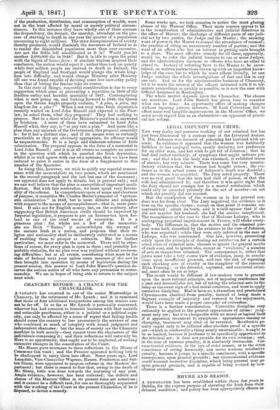CHANCERY REFORM : A CHANCE FOR THE CHANCELLOR.
A vseANCY has occurred in one of the senior Masterships in Chancery, by the retirement of Mr. Lynch; and it is rumoured that three or four additional resignations among the seniors can- not be far of In so far as Mr. Lynch is personally concerned, whoever has had occasion to transact business with that amiable and estimable gentleman, either in a judicial or a political capa- city, can only be affected by a sense of regret that failing health should cause the country to lose prematurely the-services of one who combined so much of integrity with sound judgment and independent character : but the mass of society see the Chancery machine in bulk merely--they cannot traee the characters of the individuals composing it ; and their reflections will naturally be, Here is an opportunity, that ought not to be neglected, of making extensive changes in the constitution of the Court. Mr. Hume gave utterance to these reflections in the House of Commons this week ; and the Premier appeared nothing loth to be challenged to carry them into effect. Some years ago, Lord Langdale, Vice-Chancellor Wigram, Messrs. Pemberton and Sut- ton Sharp, were appointed to propose reforms in the Masters' de- partment ; but there is reason to fear that, owing to the death of Mr. Sharp, little was done towards the maturing of any plan. Ample evidence, however, has been collected ; the defects and abuses of the Masters' Office in its present form are notorious ; and it cannot be a difficult task, for one so thoroughly acquainted with the working of the Court as the present Chancellor, if he is disposed, to devise a remedy.
Some weeks ago, we took occasion to notice the most glaring abuses of the Masters' Office. Their main sources appear to lie in the complication of administrative and judicial functions in the office of Master; the discharge of different parts of one judi- cial act by two parties, the Judge and the Master ; the seeming want of power in the Master to compel the attendance of counsel ; the practice of citing an unnecessary number of parties ; and the want of an officer who has an interest in getting suits brought to a close. The most effective remedy for all these, apparently, would be, to refer the judicial business to one or more Judges, and the administrative business to officers who have no other to- attend to. Instead of referring facts to the Master to be ascer- tained, on written instructions drawn up with an imperfect know- ledge of the case, but to which he must adhere literally, let one Judge conduct the whole investigations of fact and law in any one suit. And as for the administrative business of Chancery,. let it be made the interest of the officers intrusted with it to ter- minate proceedings as quickly as possible, as is now the case with Official Assignees in Bankruptcy.
The whole matter depends upon the Chancellor. The abuses are notorious. Lord John Russell has given time to consider what can be done. An opportunity offers of making changes without injuring private interests. If Lord Cottenham fail to effect some real tangible improvement in the Masters' Office, we must needs regard him as an obstructive—an opponent of practi- cal law reform.


































 Previous page
Previous page